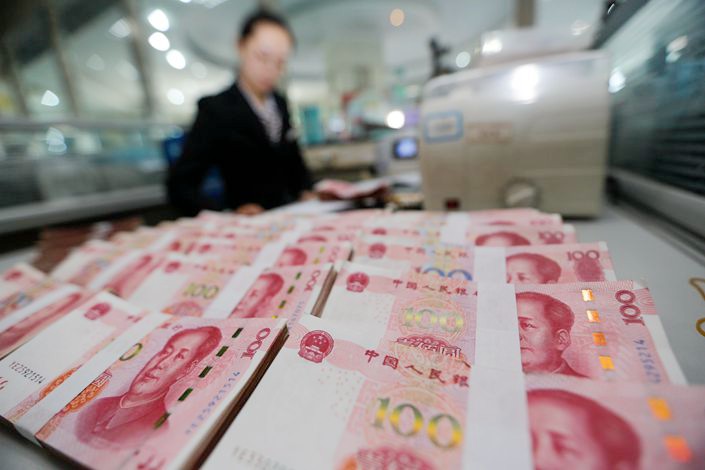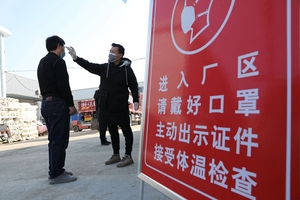In Depth: Companies Jump on Coronavirus Bandwagon With $8 Billion of Bond Sales

 |
Chinese companies have wasted no time taking advantage of a “green channel” created to fast-track bond sales by businesses needing money to fund operations related to the Covid-19 epidemic or who are suffering liquidity pressure stemming from the coronavirus outbreak.
The policy was announced on Feb. 1, and on Feb. 5 the first two bonds were issued –– one for 1 billion yuan ($142 million) by Zhuhai Huafa Group Co. Ltd., a real-estate services provider, and another for 800 million yuan by Sichuan Kelun Pharmaceutical Co. Ltd., a pharmaceutical products manufacturer. As of Feb. 21, a total of 56.2 billion yuan had been raised from the sale of 62 bonds under the “green channel” program. The phrase “epidemic prevention and control” (EPC) was tagged to the abbreviated titles or full names of 40 of the bonds.
Airlines have been hit especially hard by the coronavirus outbreak as thousands of passenger and cargo flights have been cancelled and domestic and international travel curtailed, putting severe pressure on cash flow. China Southern Airlines Co. Ltd., one of the country’s top three state-owned commercial airlines, has raised the most money, selling four bonds that brought in 6.5 billion yuan. Xiamen Airlines, a regional airline partly owned by China Southern, has obtained a total of 1.7 billion yuan, also from the sale of four bonds.
Looming cash crunch
Hunan Grain Group Co. Ltd., an agricultural products producer; Fujian Dongbai Group Co. Ltd., a department store operator; and Yunda Holding Co. Ltd., a delivery and logistics services provider, each raised 100 million yuan, the lowest figure raised so far from an EPC bond sale.
The “green channel” for fast-tracking bond sales for epidemic prevention and control purposes is one of a string of measures announced by the government to help companies survive the impact of the coronavirus outbreak which has halted vast swathes of economic activity across the country since mid-January and left millions of businesses facing a potentially life-threatening cash crunch.
The policy was jointly announced (link in Chinese) on Feb. 1 by the People’s Bank of China, the Ministry of Finance, the banking and securities watchdogs, and the foreign-exchange regulator. The National Development and Reform Commission (NDRC), the National Association of Financial Market Institutional Investors (NAFMII), and the Shanghai and Shenzhen stock exchanges set up a special channel to shorten the bond issuance process by speeding up reviews and approvals for two types of companies: those selling bonds to fully or partially use the proceeds for epidemic prevention and control, and companies that have been badly affected by the outbreak. But there are no unified rules for EPC bonds from the various regulatory bodies.
“The main purpose of launching the ‘epidemic prevention and control’ bonds is to meet the urgent needs of many enterprises,” a source close to the NAFMII, a central-bank-backed body that oversees the interbank market, told Caixin. “Some manufacturers affected by the epidemic need working capital, and some factories are facing short-term debt problems caused by the suspension of operations but they still need to pay wages and electricity bills.”
Read more
Caixin’s coverage of the new coronavirus
The NDRC, the country’s powerful economic planning agency, made it clear that “for enterprises with quality assets and good operations, but are seriously affected by the epidemic, it is permissible to issue new corporate bonds specifically to repay the principal and interest on bonds that will mature in 2020.”
And NAFMII itself specified only that “special effort should be made to help areas heavily hit by the epidemic, such as Hubei, and help them issue bonds to repay existing debt” and that at least 10% of proceeds should be used for epidemic prevention and control purposes.
A closer look at the details in the bond prospectuses suggests many companies are taking advantage of the “green channel” to get quicker access to cash and at a lower cost.
Of the total amount raised, only 22.4% on average is being used to directly support prevention and control activities, with the bulk of the money earmarked for paying down existing debt or supplementing working capital, according to Caixin calculations based on data from Wind Information, a financial information services provider. More than 50% of the proceeds of these EPC bonds on average are being used to repay debt.
Zhuhai Huafai for example claimed that 500 million yuan of the proceeds from its 1 billion yuan EPC bond sold in the interbank market would be used to supplement working capital depleted by donations to areas hit by the epidemic and by a squeeze on liquidity in operations affected by the epidemic. But public records show that donations have only amounted to 40 million yuan.
Companies that have issued bonds with the EPC tag have been able to raise money at far lower yields than the current market average, something analysts have attributed to a range of factors including the willingness of funds to invest, a re-allocation of assets by major banks into fixed-income investments, ample market liquidity, and the relatively higher credit ratings of the companies issuing the bonds.
Analysts at Huatai Securities analysts studied 25 EPC bonds — 18 from state-owned enterprises and seven from private companies — issued as of Feb. 13. It found that the coupon rates of the new bonds were significantly lower than similar bonds of the same maturity trading in the secondary market. The coupon rates on the EPC bonds of SOEs were 23 to 119 basis points lower than SOE bonds with the same credit rating trading in the secondary market while those on the debt of private companies were 29 to 415 basis points lower than similar bonds, with the exception of bonds sold by Ping An International Financial Leasing Co. Ltd.
Opportunistic sales
But some interest rates have been just too low for investors to swallow. Beijing Capital Agribusiness Group Co. Ltd., a poultry breeder, food processor and biopharmaceutical producer, issued a 1 billion yuan ultra-short-term EPC bond on Feb. 18 with a coupon rate of just 2.5% and only managed to sell 30% to investors, one investment banker with knowledge of the matter told Caixin. The underwriters, China Development Bank and Shanghai Pudong Development Bank, were left to buy the remaining 70%, he said.
SOEs have been the main beneficiaries of the “green channel” so far. Of the 62 EPC bonds issued from Feb. 5 to Feb. 21, about 80% were issued by centrally-administered or state-owned enterprises, while the remaining 20% were from privately owned companies — all with credit ratings above AA, according to Caixin calculations based on publicly available data.
One investment banking manager with a large financial institution told Caixin that some AAA-rated SOEs are issuing EPC bonds not because they are short of money, but because they are seizing an opportunity to lower their financing costs.
Regulators are also trying to ease concerns that some companies may be temporarily changing their business activities to bolster their epidemic control and prevention plans merely to satisfy regulators that they are complying with the criteria for EPC bond sales.
Caixin has learned from a source in the bond investment department of an insurance company that Fujian Septwolves Industry Co. Ltd., a clothing designer and manufacturer, plans to issue EPC bonds before the end of March pledging that at least 20% of the proceeds will be used to produce epidemic-related products such as masks and protective garments. The source said that many clothing companies are currently looking to start producing epidemic prevention products. Given the problems already plaguing the apparel industry, it’s difficult if not impossible to determine whether companies really are looking at new development opportunities or are just flagging an intention in order to be able to issue EPC bonds. “So potential investors need to carry out careful research,” the source said.
Several calls to Septwolves seeking comment went unanswered on Wednesday.
In a sign that regulators are aware of the potential problem, the NAFMII issued a notice to bond underwriters on Feb. 17 that they should closely track the use of proceeds, ensure full information disclosure and ensure that companies do not divert money from the intended use listed in the prospectus.
No panacea
Concerns have also been raised that in the rush to support corporate bond sales via the “green channel” regulatory oversight will be loosened and standards relaxed, increasing risks for investors.
But sources close to the NAFMII and the Shanghai and Shenzhen stock exchanges told Caixin that the policy is only aiming to speed up the review process rather than lowering standards. “Taking the ‘green channel’ does not mean that no questions will be asked,” an official at the Shanghai Stock Exchange who declined to be identified, told Caixin. “The required information disclosure still needs to be in place. The key is only to speed up the issuance process.
“Judging from our experience with institutional investors, they would not relax their own internal risk control standards just because these are ‘epidemic control’ bonds, especially in a year where economic pressure is already mounting,” the source said. “Because they are the ones who would face losses if issuers failed to repay.”
At the end of the day, EPC bonds are not the answer to the financing difficulties of every company, said Li Yuze, a fixed-income analyst at brokerage China Merchants Securities. “If you’re a poorly qualified company, the market isn’t going to want your bonds so you’re better off applying for special low-interest loans from the banks,” Li said.
Peng Qinqin and Han Zhongjun contributed to this report.
Contact reporter Timmy Shen (hongmingshen@caixin.com, Twitter: @timmyhmshen) and editor Nerys Avery (nerysavery@caixin.com)
Caixin Global has launched Caixin CEIC Mobile, the mobile-only version of its world-class macroeconomic data platform.
If you’re using the Caixin app, please click here. If you haven’t downloaded the app, please click here.

- PODCAST
- MOST POPULAR






